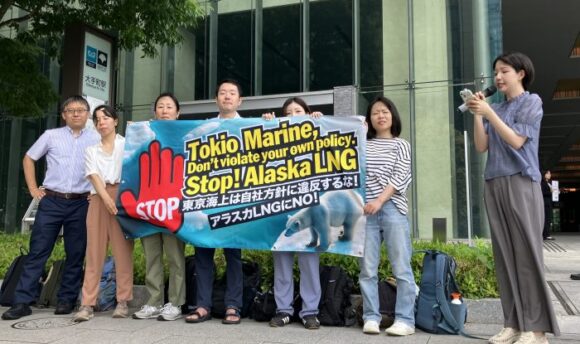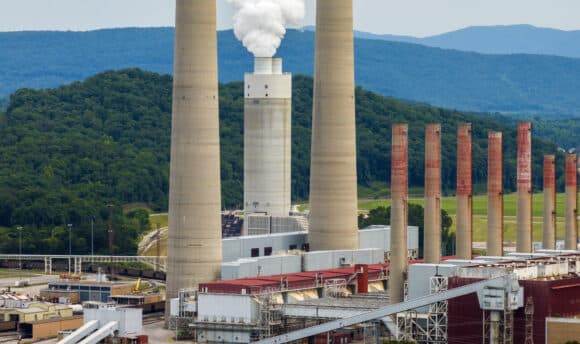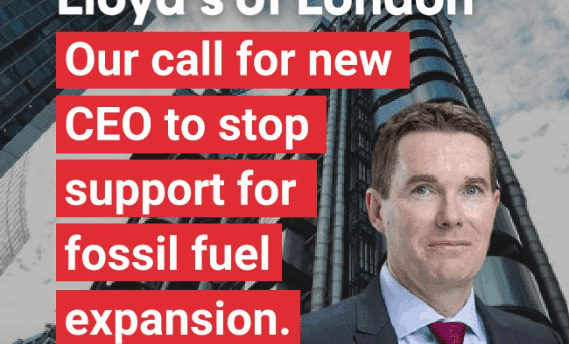The insurance industry holds the key to a safer, prosperous future if they act now.
Over 100 groups in over 27 countries across 5 continents are holding over 80 demonstrations, marches, direct actions and events this week with a clear message: Insure Our Future, not fossil fuels. The insurance industry is uniquely positioned to drive positive change and a growing number of eyes are on them to take real ambitious climate action. Fossil fuel projects cannot proceed without insurance, making the industry a strategic lever in the fight for a clean, fair, and fossil-free world. The actions will run from Feb. 26 to Mar. 3. A map of the confirmed events and actions – including Colombia, Costa Rica, DRC, France, Germany, India, Indonesia, Japan, Kenya, Nigeria, Pakistan, Peru, Romania, South Korea, Switzerland, UK, USA, Uganda and Tanzania – can be found on the Insure Our Future website or at this link.
“Insurance companies are supposed to be experts at measuring and mitigating risks, yet their ongoing support for oil, gas, and coal expansion is paving the way to a dangerous and devastating future. Billions of us are living through the catastrophic impacts of brutal wildfires, storms, floods, heatwaves, and droughts which are getting worse every year. The effects of the climate crisis, from water shortages to rising food prices, are being felt on every continent. Companies like Zurich, AIG, and Tokio Marine have the power to push for a cleaner, safer world for the next generation if they act now. It’s time to insure our future, not destruction.”
Regrettably, no insurer currently has policies that align with a path to stay under 1.5°C warming, the global target set to limit the deadliest effects of climate change. Organizers of the Insure Our Future Global Week of Action are hoping to change that and have laid out the following demands:
- Stop enabling fossil fuels: Immediately cease insuring new and expanded coal, oil, and gas projects and the companies developing them.
- Respect human rights: Immediately adopt robust due diligence mechanisms to ensure clients respect all human rights, including obtaining Free, Prior, and Informed Consent (FPIC) of impacted Indigenous Peoples and communities.
- Support a just transition: Play an active role in the just transition by increasing support to renewable projects for communities most impacted by climate change and those facing an energy-access crisis.
Many are calling out insurance companies’ hypocrisy.
“We have been telling financiers and insurers about the destruction and devastation oil and gas projects are causing to our health, communities, and sacred lands for years, yet they continued to enable its unhinged expansion. Make no mistake, money made off the extraction of oil and gas is blood money. We are tired of empty promises, we want results. End your support for oil and gas now.”
In the face of these challenges, hope remains alive. Ongoing insurance campaigning has rendered new coal plants almost uninsurable and halted many from proceeding. Thanks to campaigners raising their voices, 45 companies have committed to end or restrict insurance on coal projects, and 26 companies have introduced policies to restrict insurance on tar sands projects.
Now the focus turns to oil and gas, with 18 companies so far committing to end or restrict insurance for new projects. The laggards need to follow the climate leaders, as the pace of this shift must rapidly accelerate if we are to ensure safe living conditions for human society. The call is for the insurance industry to prioritize people over profit, protect communities, and support clean, healthy energy instead of dirty fossil fuels.
"Insurers have a huge amount of power to protect our future. The EACOP is planned as the longest heated crude oil pipeline in the world, it will run through critical wetlands and waterways, including the lake Victoria basin which 40 million people depend upon for survival. It will cause untold damage, violate human and environmental rights, and release huge amounts of carbon pollution into our already overheated atmosphere. We've succeeded in getting 28 insurance companies to rule out supporting this dangerous project, but now AIG, Tokio Marine, and Lloyd’s of London need to step up and commit to protecting our world for the next generation. Insurers should be at the forefront of a just transition by insuring clean, renewable energy, not carbon-bombs like EACOP."
To learn more about the global week of action, and the different events taking place, visit: https://global.insure-our-future.com/global-week-of-action-2024/
Major actions are planned in London, New York City, and Zurich.
###
Media notes:
Photos and videos from actions will be available on Google Drive



